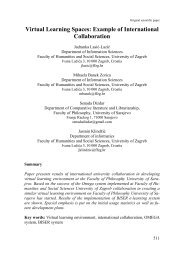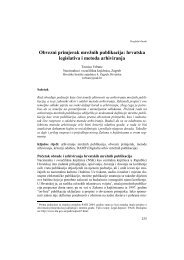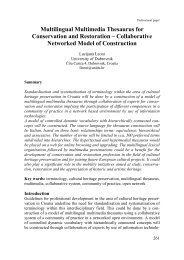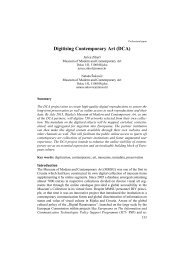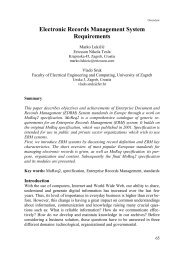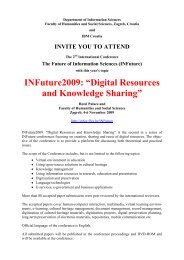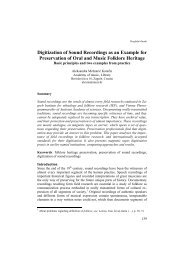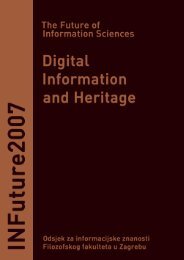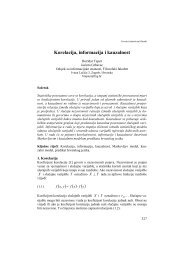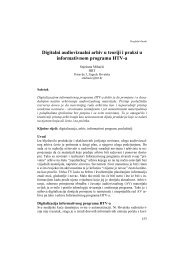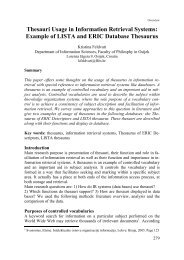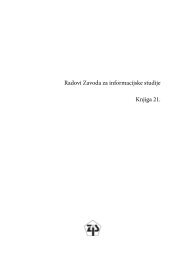Sharing Knowledge and Information: Three Views of the Future
Sharing Knowledge and Information: Three Views of the Future
Sharing Knowledge and Information: Three Views of the Future
Create successful ePaper yourself
Turn your PDF publications into a flip-book with our unique Google optimized e-Paper software.
IN<strong>Future</strong>2009: “Digital Resources <strong>and</strong> <strong>Knowledge</strong> <strong>Sharing</strong>”<br />
tion’. Solid information on our users <strong>of</strong> <strong>the</strong> future is largely lacking. It seems<br />
unwise to plan <strong>the</strong> future based on assumptions. It is this concern that has led<br />
<strong>the</strong> British Library to support <strong>the</strong> ‘Google Generation’ study mentioned in <strong>the</strong><br />
fur<strong>the</strong>r reading, <strong>and</strong> in 2009 to sponsor a study <strong>of</strong> <strong>the</strong> preceding ‘Generation Y’.<br />
The cloud<br />
One <strong>of</strong> <strong>the</strong> most interesting new trends is <strong>the</strong> movement towards ‘cloud computing’,<br />
whereby information resources <strong>of</strong> all kinds will not be held in a collection,<br />
owned by a person or an institution, but will be stored on a networked,<br />
with wireless access from any place. In 2009, this has been illustrated strongly<br />
by public enthusiasm for <strong>the</strong> Spotify s<strong>of</strong>tware, which enables music <strong>and</strong> videos<br />
to be downloaded on request from <strong>the</strong> cloud. This, if widely accepted, could<br />
mean an end to personal collections <strong>of</strong> CDs, DVDs, etc. It may not be too farfetched<br />
to imagine that books, newspaper items <strong>and</strong> journal articles could be<br />
delivered in <strong>the</strong> same way. This would call into question <strong>the</strong> whole need for <strong>the</strong><br />
‘collection’, which has been <strong>the</strong> basis for libraries <strong>and</strong> information services<br />
since <strong>the</strong>ir inception in <strong>the</strong> ancient world. There are <strong>of</strong> course many issues here,<br />
<strong>and</strong> whe<strong>the</strong>r it would be acceptable for all purposes, is a debatable point.<br />
Trend summary<br />
This brief overview <strong>of</strong> some currently prominent issues gives us a ra<strong>the</strong>r mixed<br />
picture. We see some general trends, but <strong>of</strong>ten with ‘counter-movements’ to<br />
suggest that <strong>the</strong> future is not entirely clear.<br />
Futurology <strong>and</strong> scenarios<br />
There is a long tradition <strong>of</strong> ‘futurology’ in <strong>the</strong> library <strong>and</strong> information sciences,<br />
with a particular interest in outlining possible scenarios <strong>of</strong> what <strong>the</strong> information<br />
world will be like in future years. Shuman’s collections <strong>of</strong> scenarios for ‘libraries<br />
<strong>of</strong> <strong>the</strong> future’ have been especially influential, <strong>and</strong> <strong>the</strong> writings <strong>of</strong> Sapp <strong>and</strong><br />
Pennevaria are also interesting. We will now look at three possible, very general,<br />
futures for <strong>the</strong> library / information world, based on, <strong>and</strong> accepting some <strong>of</strong><br />
<strong>the</strong> contradictions <strong>of</strong>, <strong>the</strong> trends noted above.<br />
Scenario 1: business as usual<br />
Libraries, <strong>and</strong> o<strong>the</strong>r information providers, have a generally good ‘br<strong>and</strong> image’,<br />
much goodwill, <strong>and</strong> an established place in many settings. One possible<br />
future would <strong>the</strong>refore be largely a continuation <strong>of</strong> <strong>the</strong> current situation, with library/information<br />
services continuing, <strong>and</strong> perhaps growing in importance, in<br />
something very similar to <strong>the</strong>ir current form. This seems unlikely, especially in<br />
view <strong>of</strong> <strong>the</strong> increasing emphasis <strong>of</strong> digital networked information. On <strong>the</strong> o<strong>the</strong>r<br />
h<strong>and</strong>, we might set against this <strong>the</strong> observed continuing, <strong>and</strong> to a degree renewed,<br />
enthusiasm for reading, for collections, for ‘real’ things in general, <strong>and</strong><br />
for a more shared <strong>and</strong> community-minded approach. If <strong>the</strong>se trends continue,<br />
8



